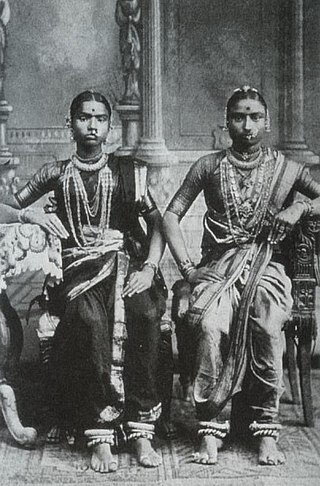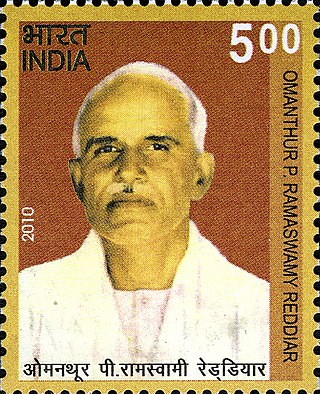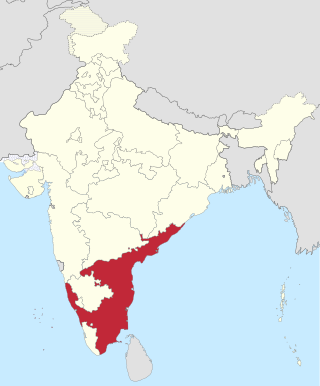Related Research Articles

India is a federal union comprising 28 states and 8 union territories, for a total of 36 entities. The states and union territories are further subdivided into districts and smaller administrative divisions.

In India, a devadasi is a female artist who is dedicated to the worship and service of a deity or a temple for the rest of her life. The dedication takes place in a ceremony that is somewhat similar to a marriage ceremony. In addition to taking care of the temple and performing rituals, these women also learn and practice classical Indian dances such as Bharatanatyam, Mohiniyattam, Kuchipudi, and Odissi. Their status as dancers, musicians, and consorts was an essential part of temple worship.

The Madras Presidency or Madras Province, officially called the Presidency of Fort St. George until 1937, was an administrative subdivision (province) of British India and later the Dominion of India. At its greatest extent, the presidency included most of southern India, including all of present-day Andhra Pradesh, almost all of Tamil Nadu and parts of Kerala, Karnataka, Odisha and Telangana in the modern day. The city of Madras was the winter capital of the presidency and Ooty was the summer capital.

Palar is a river of southern India. It rises in the Nandi Hills in Chikkaballapura district of Karnataka state, and flows 93 kilometres (58 mi) in Karnataka, 33 kilometres (21 mi) in Andhra Pradesh and 222 kilometres (138 mi) in Tamil Nadu before reaching its confluence into the Bay of Bengal at Vayalur about 75 kilometres (47 mi) south of Chennai. It flows as an underground river for a long distance only to emerge near Bethamangala town, from where, gathering water and speed, it flows eastward down the Deccan Plateau. The Towns of Bethamangala, Santhipuram, Kuppam,Mottur, Ramanaickenpet, Vaniyambadi, Ambur, Melpatti, Gudiyatham, Pallikonda, Anpoondi, Melmonavoor, Vellore, Katpadi, Melvisharam, Arcot, Ranipet, Walajapet, Kanchipuram, Walajabad, Chengalpattu, Kalpakkam, and Lattur are located on the banks of the Palar River. Of the seven tributaries, the chief tributary is the Cheyyar River.

Paramasivan Subbarayan was an Indian politician, freedom fighter and diplomat and was the First Minister of Madras Presidency, India's ambassador to Indonesia and Union Minister of Transport and Communications in Jawaharlal Nehru's government. He was the father of General P. P. Kumaramangalam, who served as India's Chief of Army staff, and of politician Mohan Kumaramangalam. He was also the grandfather of INC and BJP politician and Union Minister Rangarajan Kumaramangalam.

Omandur Periyavalavu Ramasamy Reddiyar was an Indian freedom-fighter and politician of the Indian National Congress. He served as the Premier of Madras Presidency from 23 March 1947 to 6 April 1949.
Rao Bahadur Sir Kurma Venkatareddi NaiduKCSI was an Indian politician, lawyer, diplomat, and professor who served as the Prime Minister of Madras Presidency. He also served as the Governor of Madras Presidency — one of the only two Indians in history to have held the post. He was the only person to have held both the posts of Prime Minister and Governor of the Madras Presidency. As a prominent leader of the Justice Party, he formulated policies that promoted social equality, abolition of untouchability, and social reform. He also established the first women's college in Andhra region in Eluru.
Forced prostitution, also known as involuntary prostitution or compulsory prostitution, is prostitution or sexual slavery that takes place as a result of coercion by a third party. The terms "forced prostitution" or "enforced prostitution" appear in international and humanitarian conventions, such as the Rome Statute of the International Criminal Court, but have been inconsistently applied. "Forced prostitution" refers to conditions of control over a person who is coerced by another to engage in sexual activity.

Tamil Nadu Legislative Council was the upper house of the former bicameral legislature of the Indian state of Tamil Nadu. It began its existence as Madras Legislative Council, the first provincial legislature for Madras Presidency. It was initially created as an advisory body in 1861, by the British colonial government. It was established by the Indian Councils Act 1861, enacted in the British parliament in the aftermath of the Indian Rebellion of 1857. Its role and strength were later expanded by the second Council Act of 1892. Limited election was introduced in 1909. The Council became a unicameral legislative body in 1921 and eventually the upper chamber of a bicameral legislature in 1937. After India became independent in 1947, it continued to be the upper chamber of the legislature of Madras State, one of the successor states to the Madras Presidency. It was renamed as the Tamil Nadu Legislative Council when the state was renamed as Tamil Nadu in 1969. The Council was abolished by the M. G. Ramachandran administration on 1 November 1986. In 1989, 1996 and 2010, the DMK regime headed by M. Karunanidhi tried to revive the Council. The former AIADMK regime (2016-2021) expressed its intention not to revive the council and passed a resolution in the Tamil Nadu Legislative Assembly in this regard.

The first legislative assembly Election to the Madras state based on universal adult suffrage was held in 27 March 1952. This was the first election held in Madras state after the Indian Independence. This election was officially known as the 1951 Madras State Election, even though through delays, actual voting didn't take place until early 1952.
E. Krishna Iyer was an Indian lawyer, freedom-fighter, classical artist and activist. He was the follower of traditional Isaivellalar practitioners of Sadir, also known as Bharatanatyam.

The Tamil Nadu Legislative Assembly is the unicameral legislature of the Indian state of Tamil Nadu. It has a strength of 234 members, all of whom are democratically elected using the first-past-the-post system. The presiding officer of the Assembly is the Speaker. The term of the Assembly is five years, unless dissolved earlier.
Moovalur Ramamirtham (1883–1962) was a Tamil social reformer, author, and political activist of the Dravidian Movement, who worked for the abolition of the Devadasi system in the Madras Presidency. Born in Thiruvarur, she was brought up at Moovalur, a village near Mayiladhuthurai.

Madras State was a state of India which was in existence during the mid-20th century. The state came into existence on 26 January 1950 when the Constitution of India was adopted and included the present-day Tamil Nadu, Kerala and parts of neighboring states of Andhra Pradesh and Karnataka. Andhra state was separated in 1953 and the state was further re-organized when states were redrawn linguistically in 1956. On 14 January 1969, the state was renamed as Tamil Nadu.

The practice of prostitution in colonial India was influenced by the policies of British rule in India. During the 19th and 20th centuries the colonial government facilitated, regulated and allowed the existence of prostitution. Not only was prostitution in India affected by the policy of the Governor General of India, it was also influenced by the moral and political beliefs of the British authorities, and conflicts and tensions between the British authorities and the Indian populace at large. The colonial government had a profound effect on prostitution in India, both legislatively and socially.
Bombay Devadasi Protection Act (1934) was passed by the Bombay High Court under British India to protect existing Devadasis and prevent the dedication of women into the Devadasi system of existence. The act extended to the whole state of Maharashtra, and was part of other state laws to protect Devadasis, such as the Madras Devadasis Act, Bombay Protection (Extension) Act, and the Andhra Pradesh Devadasi Act.
Isai Velalar is a community found in India in Tamil Nadu. They are traditionally involved as performers of classical dance and music in Hindu temples and courts of the patrons. The term "Isai Velalar" is a recent community identity, people of minstrel occupation from various castes such as, Melakkarar, Nayanakkarar and Nattuvanar come under this term.
References
- ↑ B. S. Chandrababu; L. Thilagavathi (2009). Woman, Her History and Her Struggle for Emancipation. Bharathi Puthakalayam. p. 264. ISBN 978-8189909970.
- ↑ V. Sithannan (2006). Immoral Traffic: Prostitution in India. JEYWIN Publications. p. 21. ISBN 978-8190597500.
- ↑ Parvathi Menon (2000). Alice Thorner; Maithreyi Krishnaraj (eds.). "Ideals, Images and Real Lives: Women in Literature and History". Frontline . 18 (16). Retrieved 27 May 2013.
- ↑ Vadivelu Rajalakshmi (1985). The Political Behaviour of Women in Tamil Nadu. Inter-India Publications. ISBN 978-8121000208.
- ↑ Ananya Chatterjea (2004). Butting Out: Reading Resistive Choreographies Through Works by Jawole Willa Jo Zollar and Chandralekha. Wesleyan University Press. p. 173. ISBN 978-0819567338.
- ↑ Moovalur A. Ramamrithammal (2003). "Lobbying for Devadasi Abolition: From Artiste to Prostitute". In K. Srilata (ed.). The Other Half of the Coconut: Women Writing Self-respect History. Zubaan. p. 100. ISBN 978-8186706503.
- ↑ Gurmukh R. Madan (1979). Western Sociologists on Indian Society: Marx, Spencer, Wever, Durkheim, Pareto . Taylor & Francis. p. 351. ISBN 978-0710087829.
- ↑ Davesh Soneji (2012). Unfinished Gestures: Devadasis, Memory, and Modernity in South India . University of Chicago Press. p. 110. ISBN 978-0226768090.
- ↑ Promoting Women's Rights As Human Rights. United Nations. 1999. p. 97. ISBN 978-9211200034.